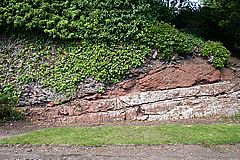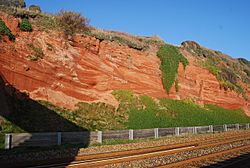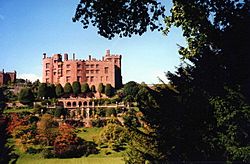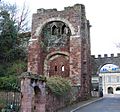New Red Sandstone facts for kids
The New Red Sandstone is a type of sandstone rock found in Britain and other places. It formed a very long time ago, between the Permian period (about 280 million years ago) and the start of the Triassic period (about 240 million years ago).

This rock was created in very dry, desert-like conditions. It is different from another rock called the Old Red Sandstone, which is much older. The New Red Sandstone is usually much brighter and redder. Its strong red color comes from tiny bits of iron oxides (like rust) mixed into the rock.
Contents
How New Red Sandstone Formed
The New Red Sandstone was laid down in vast deserts. Strong winds blew sand around, forming huge dunes, much like deserts today. Over millions of years, these sand grains were pressed together. Minerals, especially iron oxides, cemented the grains. This process turned the loose sand into solid rock.
Ancient Desert Environment
During the Permian and Triassic periods, the landmasses on Earth were grouped into a supercontinent called Pangaea. The area that is now Britain was located much closer to the equator. This position meant it had a hot, dry climate. This climate was perfect for creating deserts. The sand that formed the New Red Sandstone came from older rocks. These rocks were worn down by wind and water.
Distinguishing from Old Red Sandstone
It's important not to confuse the New Red Sandstone with the Old Red Sandstone. Even though both are red, they formed at different times.
Age Difference
The New Red Sandstone formed from about 280 to 240 million years ago. This was during the Permian and Triassic periods. The Old Red Sandstone is much older. It formed during the Devonian period, which was about 416 to 359 million years ago.
Color and Appearance
While both are red, the New Red Sandstone often has a brighter, more vivid red color. This is due to the specific types of iron oxides present. The Old Red Sandstone can be a duller, more brownish-red. Geologists use these differences, along with the types of fossils found, to tell them apart.
Uses of New Red Sandstone
New Red Sandstone has been used for many things throughout history. Its attractive color and strength make it a popular building material.
Building Material
Many historic buildings and castles in Britain are made from New Red Sandstone. Its durability means these structures have lasted for centuries. For example, parts of Exeter's ancient city walls and Rougemont Castle in Devon use this stone. Its warm, red color adds a unique look to these buildings.
Images for kids
-
Exeter, Devon, ancient city walls of Isca Dumnoniorum with medieval and Roman elements
-
Exeter Castle, Devon, c1068 Anglo-Saxon and Norman elements of New Red Sandstone with reused earlier Roman elements
 | Jessica Watkins |
 | Robert Henry Lawrence Jr. |
 | Mae Jemison |
 | Sian Proctor |
 | Guion Bluford |






